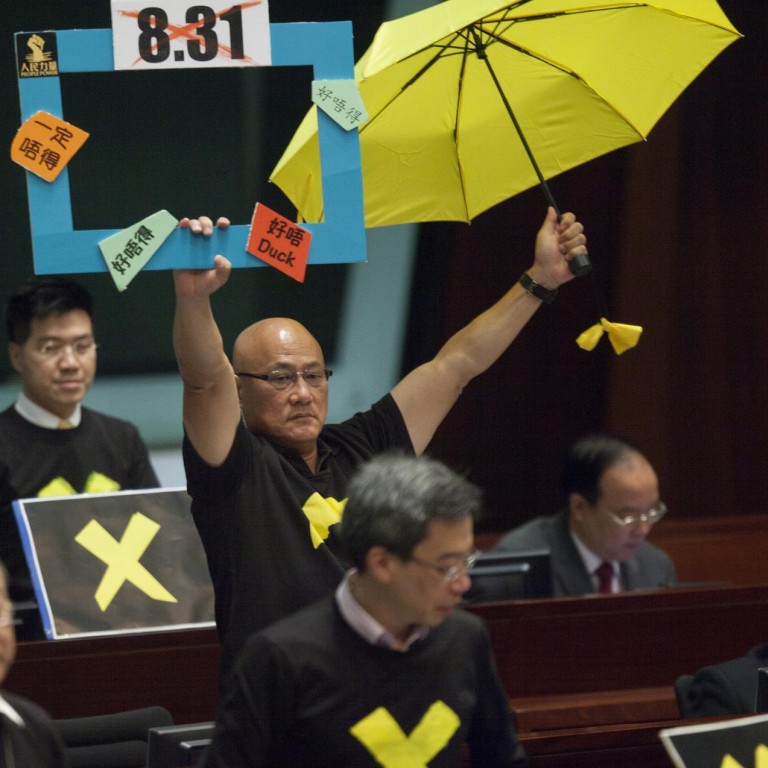
Hong Kong is stuck in the mud, stifled by polarised politics
Andrew Sheng says the city's laissez-faire policy needs to be seen in the context of local politics, which is grinding us down while our regional competitors up their games
Hong Kong has prided itself on being the freest economy in the world, but last week Chief Executive Leung Chun-ying said the "positive non-intervention" policy is outdated. Is this the end of the laissez-faire philosophy that has served Hong Kong successfully for the past half a century?
The phrase "positive non-intervention" is attributed to John Cowperthwaite, financial secretary from 1961-71, a Scotsman who inherited the moral philosophy of his countryman Adam Smith. His first speech as financial secretary marked his approach to markets: "In the long run, the aggregate of decisions of individual businessmen, exercising individual judgment in a free economy, even if often mistaken, is less likely to do harm than the centralised decisions of a government, and certainly the harm is likely to be counteracted faster."
History has shown Cowperthwaite more right than wrong. He did not say that investors might not panic (as in recent share crashes) or that government does not have a role in markets. He was simply saying that decision-making in a world of uncertainty is better made by markets. That philosophy is also built into the third plenum, where Chinese planners recognise that markets are better at innovation, job creation and resource allocation than the state.
The centre of gravity is shifting away - Shenzhen, Singapore, Shanghai, Seoul and Sydney are becoming alternative centres of culture, innovation and creativity
In the debate between state and market, there has been too much of a tendency to see the issue as black and white, whereas Cowperthwaite's dictum of positive non-interventionism fitted the Chinese dialectic philosophy of (intervention versus self-order). There is always room for intervention, even if the natural order of markets follows the Tao.
What has changed in Hong Kong is the politics since 1997. The polarisation of political views has meant the government has become paralysed in exactly its areas of previous strength: education, innovation (technological catch-up) and infrastructure (still good, but creaking). The civil service is now caught between the politics, social media and genuine social needs. When top civil servants have to spend more time answering questions in Legco and the media, rather than getting on with the job, are we surprised that the mentality is switching from one of "can-do" to one of "no do, no mistakes, wait for retirement"?
Positive non-interventionism is not wrong, but the context has changed. With strong reserves, openness to global talent but high costs, the business community is asking whether they can concentrate their resources on business or should they be worried about more state intervention? If the latter, can the Hong Kong government deliver more business-friendly incentives than governments elsewhere?
The long game for Hong Kong is structural: how can Hong Kong build up its talent to benefit from the internet age, rather than protesting against anything that moves? While citizens are still debating who is right or wrong, competitors are already upping their game. The centre of gravity is shifting away - Shenzhen, Singapore, Shanghai, Seoul and Sydney are becoming alternative centres of culture, innovation and creativity.
Thus, the issue is still about local politics, not about business. To blame the civil service for not being in sync with the leadership is the wrong game. Even if the bureaucracy is willing to follow the new change in philosophy, it can't get past the current meat-grinder political process.
Hong Kong politics is in a quagmire because both sides see issues in black and white. One thinks that democracy is all about one person, one vote, and the other thinks it's possible to do business as usual.
Cowperthwaite was the right man at the right time; he melded Scottish moral philosophy with Chinese dialectic pragmatism. To get anything done, the Chinese philosophy has always been about three things: timing, geography and social unity. With Hong Kong still in the fastest-growing region in the world, the only thing lacking to move forward is social unity.
And how to get social unity is clearly the responsibility of Hong Kong's leadership, at all levels.

